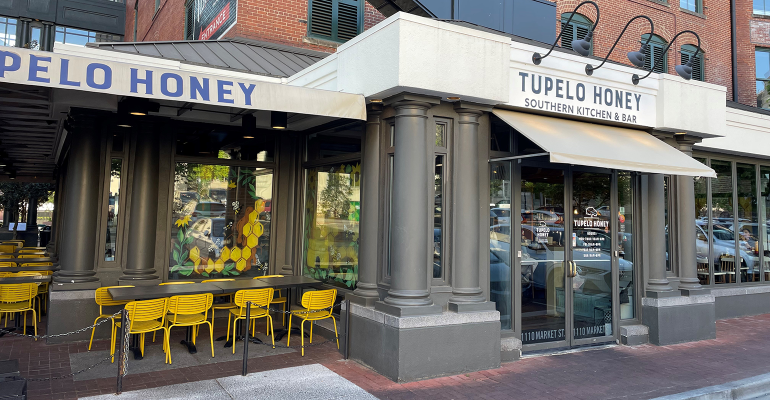Restaurant companies that can solve at least part of the recruitment and retention puzzle will undoubtedly be well positioned in this post-pandemic environment. Tupelo Honey has put many pieces into place to do just that.
According to COO Caroline Skinner, the Asheville, N.C.-based brand with about 25 units has spent the past 10 years dedicating its focus to putting its employees first and innovating its approach along the way. The company increased its wages before most states did the same, for instance, and now has a fair start wage of $15 an hour, guaranteed regardless of position. The company also provides paid time off, parental leave, medical and dental insurance, wellness, transportation and tuition reimbursements, and more.
All of these benefits are part of what the company calls its “Honeypot” program, which Skinner calls a catch-all to appeal to a diverse roster of employees.
“It’s cute and it’s on brand, but at its core, it’s a pot of benefits that you can access depending on where you are in your life. You might access something like tuition reimbursement or family leave,” she said in a recent interview with Nation’s Restaurant News. “You can dip into it as needed and know no matter what your circumstances are or where you are in life, there will be something for you.”
Perhaps its most successful employee-focused initiative is its Biscuits for a Cause program, developed during the pandemic to direct profits from the company’s signature biscuits into an employee relief fund, which helps Tupelo team members facing unexpected hardships.
“We’ve always given away biscuits for causes, but the best decision we ever made was to charge for our biscuits and move those profits to our employees, because at that time, we were struggling to support them as best as we could,” Skinner said. “It was a difficult time. Recently, there is less of a Covid impact, so we started pivoting some of those funds to expand training and diversity in our workforce.”
Tupelo Honey created a new, year-long program called Aspire, for instance, which provides coaching and group-setting development work for underrepresented employees. The first Aspire cohort included eight people. The following year, there were 12 employees involved. Skinner said the program has yielded a 75% promotion rate.
“We knew if we truly wanted to be inclusive, we had to start with our workforce. If you see someone in leadership that looks like you, you attract more diverse candidates,” Skinner said. “This has done such great things for our recruitment efforts. As we open more locations, the Biscuits for a Cause fund grows, so we expect more from this.”
Of course, these programs are powerful messaging tools for recruitment, but in order for them to work for retention, that messaging has to match the experience in the field. Skinner said Tupelo Honey does this in a few ways — among them, ensuring appropriate scheduling practices for work/life balance and empowering its general managers.
On that first piece, Tupelo Honey has been focused on trying to get schedules posted two weeks in advance. It’s also introduced an operating partner program that includes the choice between a four-week sabbatical or two weekends off a month.
“In this industry, which is historically weekend heavy, this offers a way to have a balance,” Skinner said.
General managers, meanwhile, have been empowered more through a GM summit, now in its second year, which provides those employees with the opportunity to network with each other and with vendors, and to share best practices and pain points. GMs are also in charge of a new program called One Guest, in which they identify frequent customers in their restaurants and provide them with a honeybee coin that unlocks exclusive benefits like free appetizers. It’s sort of like a loyalty program, but customers have to be invited by those managers, who have the strongest pulse on their clientele.
“The program is designed to make guests feel special, and it empowers our managers to bring that hospitality and joy. It allows them to tell a guest, ‘You’re special and I want to invite you into this program,’” Skinner said. “We want to blow people away at the door with our hospitality, and it starts with our employees. If they’re not passionate or empowered to do that, it won’t happen.”
The average tenure of Tupelo Honey’s general manager is six years. Hourly turnover rates are around 90% — much lower than industry averages. These retention numbers have lifted the brand’s performance, Skinner said. Tupelo Honey now generates about $4 million in average unit volumes, which is supporting its ambitious growth plans of six to eight openings per year and doubling its footprint in the next few years.
“We would not have the ability to grow the way we’re growing if we weren’t focusing on the workforce,” Skinner said. “We got smarter through the pandemic by leveraging tech and tools to expand the reach of what we can do, but also by recognizing that we as an industry can’t continue to treat employees the way we have for so long. We have to provide better pay and benefits, and if we do that, everything else stabilizes.”
Contact Alicia Kelso at [email protected]
Hear from Tupelo Honey senior director of talent & training Alesha Sisk and other CREATORS honorees at CREATE: The Experience, Oct. 1-3 in Palm Springs, in a panel sponsored by Keurig Dr Pepper.





